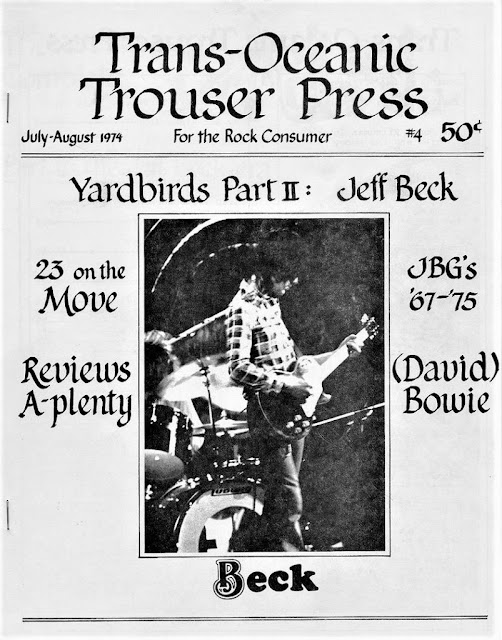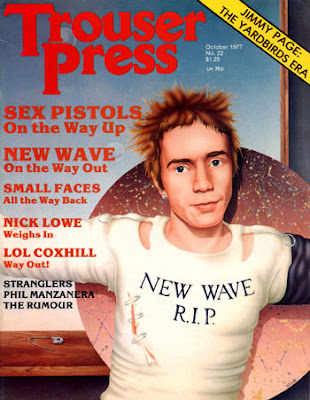It's the 50th anniversary of the founding of Trouser Press, celebrated by the publication of an anthology.
In my mind, I always think of Trouser Press as archetypally New Wave, in part because of the graphic look of its famous record guides....
.... but also because all the issues I've ever seen have had New Wave (in all its senses - punk... skinny-tie power pop... and the MTV Brit Invasion era groups that we in the UK call New Pop) artists on the front cover.
So I was surprised to learn that the magazine actually predates punk. It was founded in 1974.
What defined its orientation, in fact, was not championing the New Wave, since that didn't exist then...
It was Anglophilia.
It was initially called Trans-Oceanic Trouser Press - hungry hands reaching across the Atlantic, to where the Good Music was - Great Britain.
Anglophilia so pronounced for a while it billed itself as
"America's Only British Rock Magazine" !
Which sounds like a play on, and deliberate definition against, Creem's self-billing as "America's Only Rock 'n' Roll Magazine" (itself self-definition against Rolling Stone).
So originally Trouser Press was Old Wave, simply because there was no other Wave.
Instead it believed that the Britannia ruled the (air)Waves.
I suppose even the word "trouser" is Anglophiliac, given that Yanks say "pants"
Although looking into it, seems they say "trouser press" over here as often as "pants press"
If like me you've always thought of Trouser Press as Noo Wave throo and throo, it's quite the surprise to see all these
soon-to-be-decreed "Boring Old Farts" featured so heavily - the Queens and the Whos.
Even outright proggers like Camel! Ex-Procol guitarman Robin Trower!
The first time an American artist gets the front cover treatment is Todd Rundgren - a chronic Anglophile himself - in July 1978, which is the thirtieth issue of Trouser Press.
I was surprised how long the coverage of Old Wave dominated. Deep into 1978, the B.O.F.'s are still getting nearly all the front covers - and the majority of the features inside too.
Groups like Gentle Giant! The Strawbs!
Endless appearances for Petes Townsend and Frampton.
For Jeff bloody Beck.
"Reviews A-Plenty" - what is this, the Mayor of Casterbridge?
Sparks featured - a group that some Britcrit or other quipped was "the best British band in America" or words to that effect
That cover looks like a beer mat.







































For many Americans, Anglophilia was a form of rebellion, especially as it came through our radios and TV screens.
ReplyDeleteI like to see it as the young person's equivalent to the parents being into Masterpiece Theatre and Britcoms on PBS. Like a class reflex. Not exactly the equivalent of the Australian "cultural cringe", but an odd sort of genuflection to the mother country that the United States is supposed to have broken away from.
DeleteMy parents were into those British imports on PBS when I was a child and teenager, and I was pretty enthusiastic about Python, FAWLTY TOWERS, the George Smiley films, etc. at the time. But the MTV wave of '84 was welcomed by a lot of women and queer men in small town America as a less macho alternative to hard rock and country.
Delete'Trouser Press' comes from a Bonzo Dog Band track - in other words, it's a dog whistle for anyone in America who was already aware of them (which wasn't a lot, obviously, but more than you'd think)
ReplyDeleteUS Anglophilia also had a lot to do with other imports coming in on the heels of the British Invasion - The Avengers, The Prisoner (both of which ran on American network prime-time), and Richard Lester films in the 60s; Python*, Baker-era Doctor Who and some Dennis Potter in the 70s and early 80s. This caused a misleading impression that UK culture was of a generally higher standard than the US's, when in fact what was happening was that most of the cream was rising to the top and being skimmed off for the American market (along with a few bits of deitrus, as evidenced by another notable import, Benny Hill)
*Phython, by the way was almost exclusively known through their albums in the US until about 75-6, to the point where they were considered almost a British version of the Firesign Theater or National Lampoon Radio.
On a commentary for a Simpsons episode, Matt Groening describes getting hold of a print of And Now For Something Completely Different and running it at the campus theater at Evergreen College (an extremely artsy/hippie school mind you) and the audience reacting with stunned silence
Another note - pre-punk, the glam/glitter rock audience in America overlapped very heavily with the prog/art rock audience, to the degree that they were often one and the same (you were apt to find a Roxy or Bowie LP mixed in with Gentle Giant and Crimson collections, or vice versa - after all, it was all airy-fairy, un-Zep/Sabbath-like English rock to unenlightened Yank ears)
DeleteYou can't get much deeper into Anglophilia as an American than being into the Bonzos
DeleteWell, the 'high glam' end of things did blur into prog - Cockney Rebel, Roxy, Bowie. I think the dividing line in high and low glam is whether you would get an invite to be on the Old Grey Whistle Test. I don't think Slade would have, or the Sweet. But an "image-band" that had an arty aspect would fit.
DeleteMind you Bob Harris famously had both Sparks and New York Dolls on the Whistle Test and made snide comments about them both.
I think Bob Harris's "mock rock" comment on the Dolls wasn't supposed to be snide, it was basically a statement of fact. Watching the clip, he is obviously smiling and enjoying their performance.
DeleteI suspect he justifiably thought that the Dolls were at least a semi-ironic band, like The Tubes, and was appreciating them on that level. Which is more than they deserved, tbh. The opprobrium he received for this was just the punks looking for an excuse to excise him.
"seems they say 'trouser press' over here as often as 'pants press'" - Possible because the trouser press was a British invention (just to add even more Anglophilia) and Corby had the worldwide patent for many years.
ReplyDeleteA good test of contemporary American Anglophilia would be knowing the scene where Alan Partridge dismantles a trouser press out of boredom.